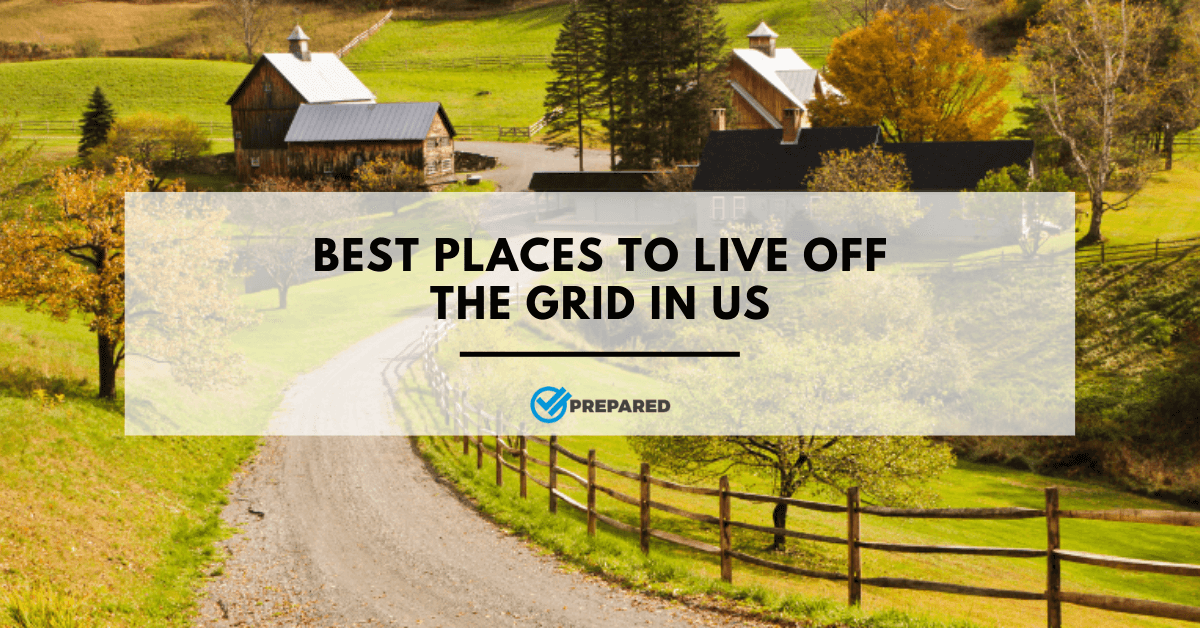Living in the city is becoming more expensive by the day, especially when inflation is rising. The hustling and bustling environment can also drain us. This is why there are people who have started living in places where they’ll be far from the madding crowd. Have you been considering going low too? Then here are the factors that you need to consider and five of the best places to live off-the-grid in the US.
Factors to Consider Before Choosing an Off-the-grid Location
Before moving somewhere to live off the grid, you should consider several factors. Let’s look at these.
Weather and Climate
Some people love cold climates while others love bright, sunny, warm places. Some people love experiencing the colours of the changing seasons. Before you make a decision, see which places have the weather and climate that you prefer.
Water Availability
Water availability is a major factor, as going off the grid can also mean the place is disconnected from water lines. When choosing a place, see how available the water is. Also, check if they have septic system regulations.
Natural and Other Resource Availability
When considering a place, check to see if it has enough source of natural resources as you would need lots of rocks and timbers as well as water. See if you can avail electricity and in what forms.
Also, check if the place you’ll be living in is suitable for livestock and agriculture and if you can find fresh edible fruits and vegetables growing naturally.
Laws and Regulations
Before moving to a place, check how restricting the laws and regulations are. Going off-grid means you may face issues with clean water and the power grid. See the state laws about the septic system and if you can make your own electricity if you need to.
Another thing to consider is the building codes to know if you have the freedom of building your home the way you like or if you need to follow some restrictions.
Zoning Restrictions
When choosing a state, check what its zoning restrictions are. See if you have any scope for rezoning, and always choose suitable land for agriculture and growing livestock.
Land Prices
Cheap land doesn’t necessarily mean it’s good. Land that is rich in resources and opportunities and in good condition tends to be expensive. If you find cheap land, see if it’s in a swamp or has other disadvantages.
Agricultural land tends to be cheaper, but see if there are other opportunities that the land can provide.
Living Costs
If you go off the grid, you have the opportunity to grow your own food and raise your livestock. You may also have a lot of resources around, so you will already be saving lots of money.
See what the billing will be for water, electricity, oil, and gas, or if you’ll need to arrange them by yourself.
ALSO SEE: Homesteading: Where to Start?
Taxes
The main type of tax that you will face is property taxes. Try to choose a large land so that you can rezone it to agricultural property. If you can only find a small piece of land, see if you can have it classified as a farm. This will lower the taxes dramatically.
Natural Hazards
Before choosing a location, check how prone that place is to natural hazards and what protocols the state follows in those situations. You wouldn’t want to be caught in a cyclone or earthquake, lose your home and possessions, and have no clue whom to appeal for help.
Best Places to Live Off The Grid in the US
Considering the hits and misses on all the factors, here are the top five places for you to live off the grid.
Missouri
I think Missouri is the best place to live off the grid in the US. It’s primarily rural, giving you many opportunities to choose your property for agriculture and livestock, and it has the perfect weather for farming.
The state laws aren’t particularly strict in the rural areas, so you’re free to live how you want. They also don’t demand any connection to a septic system, so you’re free to use the water resources however you want.
However, Missouri is prone to natural disasters like storms, floods, tornadoes, and dust storms. In this case, the state has a set of protocols to deal with them and ensure everyone’s safety.
Oregon
Oregon is extremely diverse in its climate given the variety of its landscapes. Some places are always wet and humid with great conditions for agriculture, some face icy climates, while others are desert. Generally, Oregon faces mild winters and moderate summers.
You’ll find land at a decent price in Oregon. It’s also rich in resources. As an off-grid resident, you can source your own water and electricity. They also don’t impose many restrictions on hunting!
Because of its geographic diversity, Oregon is prone to many natural disasters such as flooding, volcanoes, high winds, and winter storms. Although they don’t have many protocols for its residents, they do encourage residents to prepare themselves for natural disasters and call for help.
Florida
It’s totally legal to live off-the-grid in Florida, but you need to get a septic system. You can always avail of local electricity sources, and you’ll also have plenty of water resources. Raising livestock and making farmland is easier too, and land is affordable.
Natural calamities are frequent visitors in Florida, for which you need to stay prepared with evacuation plans and an emergency food and resources kit. The government has mitigation projects to help Florida residents stay safe in these disasters and recover soon.
ALSO SEE: Our Favorite Homesteading Books
Vermont
If you want to live off-the-grid in Vermont, it’s better to stay away from the larger cities and towns. The rural areas are abundant in farming and housing resources, and water is reasonably available. The zoning laws also favor the residents, so you can farm and raise livestock easily. Lands are also affordable and available.
Although not as much as the previously mentioned places, Vermont is still susceptible to natural disasters like floods, winter storms, thunderstorms, and forest fires. There are guidelines available to stay safe in such situations in Vermont.
Utah
Utah is a beautiful place to live off-the-grid as it’s full of beautiful landscapes and parks—a dream for nature lovers. Despite that, the lands are very affordable and have low property taxes. However, Utah has regulations regarding collecting rainwater, so you should keep that in mind.
Utah is prone to calamities like drought, severe storms, wildfires, and flash floods. Although the occurrences are low, they collaborate with experienced teams to help people face such disasters.
Some other states where you can consider going off-grid are Hawaii, Texas, Maine, Alabama, and Tennessee.
Conclusion
Living off the grid has a lot of perks, especially if you live in the USA where there’s plenty of natural diversity.
Moreover, you can live a low-cost life, be more in touch with nature, grow your own food, stay away from all the high expectations from the media and urban life, and focus on hobbies that make you happy.
With these five best places to live off the grid in the US and the factors you need to consider, we hope you can make an informed decision.

Chris was born and raised in South Africa and has worked in the field of risk management, organisational resilience, and business continuity for more than a decade. During his career he has seen how private and public sector organisations benefit from effective risk management and business continuity planning. Realising that families and communities can also benefit from the same tools, methodologies, and principles, he started Prepare with Foresight.
Prepare with Foresight was launched to assist individuals and families to have the peace of mind that they will be able to recover from and successfully adapt to the consequences of adverse events.

